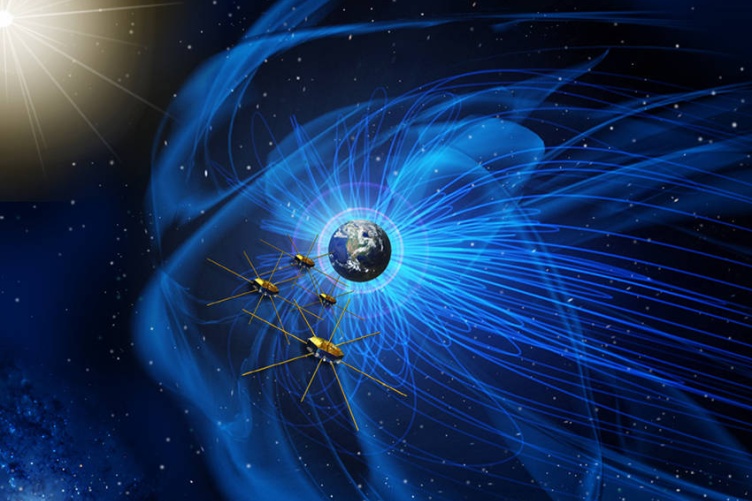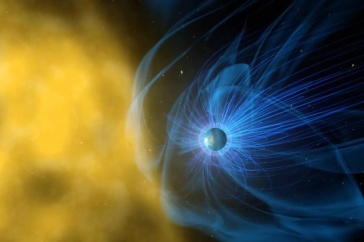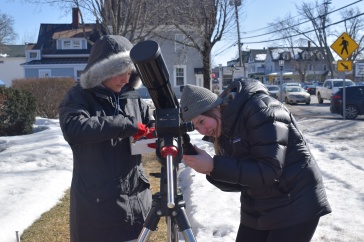
Photo by: NASA
A physicist with the UNH Space Science Center (SSC) has been selected to lead two research projects and will co-lead two additional projects to study space energy transfer and to create three-dimensional space visualizations for K-12 students. UNH will receive approximately $1.2 million for its role in these four projects.
Matthew Argall, an assistant research professor of physics in the SSC, is the principal investigator on a NASA-funded project titled, “Enhancing visualizations for public relations and outreach using Magnetospheric Multiscale Mission (MMS) reconstructions of magnetic reconnection.” The MMS Mission, in which UNH faculty, engineers and scientists (including Argall) played prominent roles, produced first-of-its-kind 3D measurements of space plasma processes and magnetic reconnection — when the magnetic field lines in the Earth’s magnetosphere break or merge with other field lines from the sun and release huge amounts of energy, causing space weather storms that produce beautiful displays of Northern Lights, but can also interfere with our technology. With this new funding, Argall will use these 3D data from MMS to create virtual reality simulations of the outer space environment to help teach the next generation about energy in space. Argall will support a UNH post-doctoral researcher and collaborate with colleagues from the UNH Data Visualization Research Laboratory on this project.

“This research project will help fulfill a long-standing goal of mine to bring space closer to home for a more immediate impact on my community,” he says. “I am excited for my son to try on the VR headset, play with space plasmas, and learn about magnetic reconnection in a way kids learn best: by exploring.”
Argall was also selected to lead a project titled, “The evolution of kinetic entropy and its connection to energy transfer in fundamental processes,” with funding provided by a NASA Heliophysics Guest Investigator award. By applying a newly developed theory of entropy — how ordered or disordered space plasmas are — to the data amassed by NASA’s MMS Mission, this new project will help scientists better understand the powerful forces of energy transfer that occur in our near-space environment and that can affect astronauts in space and technology here on Earth. This project will also support a UNH graduate student, and will be conducted in collaboration with colleagues from West Virginia University and the University of Maryland.
“Studying entropy with MMS is exciting because it is a fundamental parameter but normally thought of as a state variable, meaning it describes an entire system,” says Argall. “MMS, however, is a tiny point within the systems it was designed to study. Our recent theoretical work developed local measures of entropy that we can study with MMS. With this new project, we will use entropy to make fundamental discoveries of energy transfer during magnetic reconnection.”
Related to this topic of entropy and energy transfer, Argall is a co-principal investigator on two additional research grants: “Understanding energy conversion in magnetotail reconnection using kinetic entropy,” funded by the NASA Early Career Investigator Program; and “Energy Conversion Beyond the First Law of Thermodynamics in Non-Equilibrium Plasmas,” funded by the National Science Foundation (NSF) Magnetospheric Physics. Argall will collaborate with colleagues from West Virginia University and the University of Maryland on these projects as well.
The UNH Institute for the Study of Earth, Oceans, and Space (EOS) is UNH's largest research enterprise, comprising six centers with a focus on interdisciplinary, high-impact research on Earth and climate systems, space science, the marine environment, seafloor mapping and environmental acoustics. With approximately 100 principal investigators managing more than 400 individual grant awards, and with annual expenditures exceeding $77 million, EOS fosters an intellectual and scientific environment that advances visionary scholarship and leadership in world-class and graduate education.
-
Written By:
Rebecca Irelan | Institute for the Study of Earth, Oceans, and Space | rebecca.irelan@unh.edu | 603-862-0990
















































